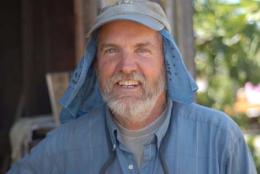Read the full text transcript (PDF) and listen to the audio for the oral history with Jim Leap.
- Transcript and full audio. Audio may be accessed through the "Supporting Material" tab at the bottom left of the page. University of California Escholarship Site.
 Jim Leap. Photo by Tana Butler.
Jim Leap. Photo by Tana Butler.
Since 1990, Jim Leap has managed the 25-acre farm at UC Santa Cruz—designing crop systems, overseeing production, purchasing and maintaining equipment, teaching apprentices, supervising staff, coordinating field research, helping write training manuals, and educating students and visitors about the farm. In March, 2009, he was recognized with the UC Small Farm Program’s Pedro Ilic Award for Outstanding Educator. The honor is named for an influential Fresno County small-farm advisor who was an important mentor to Leap.
With California family roots reaching back to the 1850s, Leap grew up in California’s Central Valley. His father, an independent insurance agent and anti-racism activist, wrote policies for the United Farm Workers at a time when other insurers refused the organization’s business. Growing up in the 1960s, the young Leap was exposed to UFW grape boycotts, Teatro Campesino productions, and other activities connected with the farm worker movement. As a teenager, he harvested grapes in 110-degree heat—straining to keep pace with his fellow workers, and learning firsthand about the human costs of large-scale, profit-first farm practices.
After graduating from Fresno High in 1973, frustrated by the circuitous and drawn-out aspects of political activism, Leap sought to challenge the agribusiness status quo in a more direct, hands-on way. He ended up founding a successful small farming operation of his own, where he emphasized sustainable methods, drawing inspiration and guidance from innovative Central Valley growers. He also worked as crop production manager for a federally funded program that trained Native American farmers, a position that enabled him to run field trials for novel production techniques.
At thirty, Leap returned to school, completing an agricultural science degree at Fresno State while maintaining his farm, and graduating with honors in five years. He envisioned continuing on to a master’s degree and eventually becoming a farm advisor. Instead, at a friend’s urging, he applied for the operations-manager position at the UCSC Farm, and was offered the job, which has been more than a full-time occupation ever since. Sarah Rabkin interviewed Jim Leap in the Regional History Project offices at McHenry Library, UCSC, on June 9, 2008.
Links:
- Center for Agroecology and Sustainable Food Systems: http://casfs.ucsc.edu/

 Santa Cruz, CA
Santa Cruz, CA



